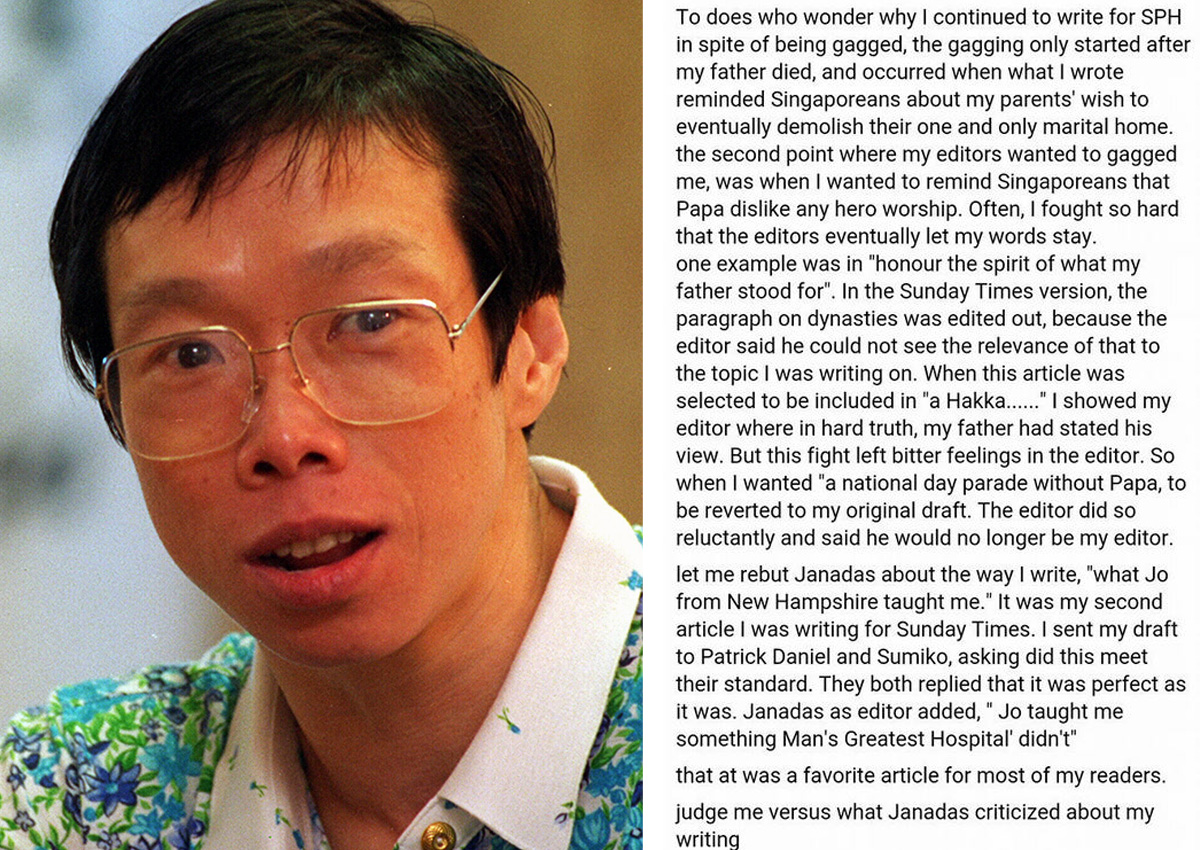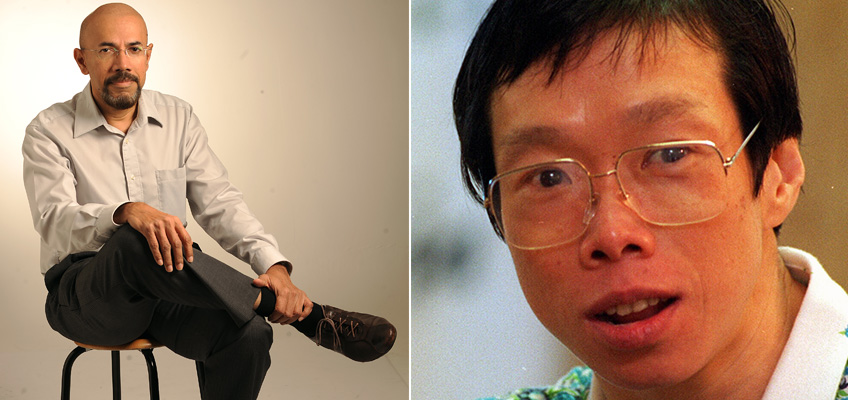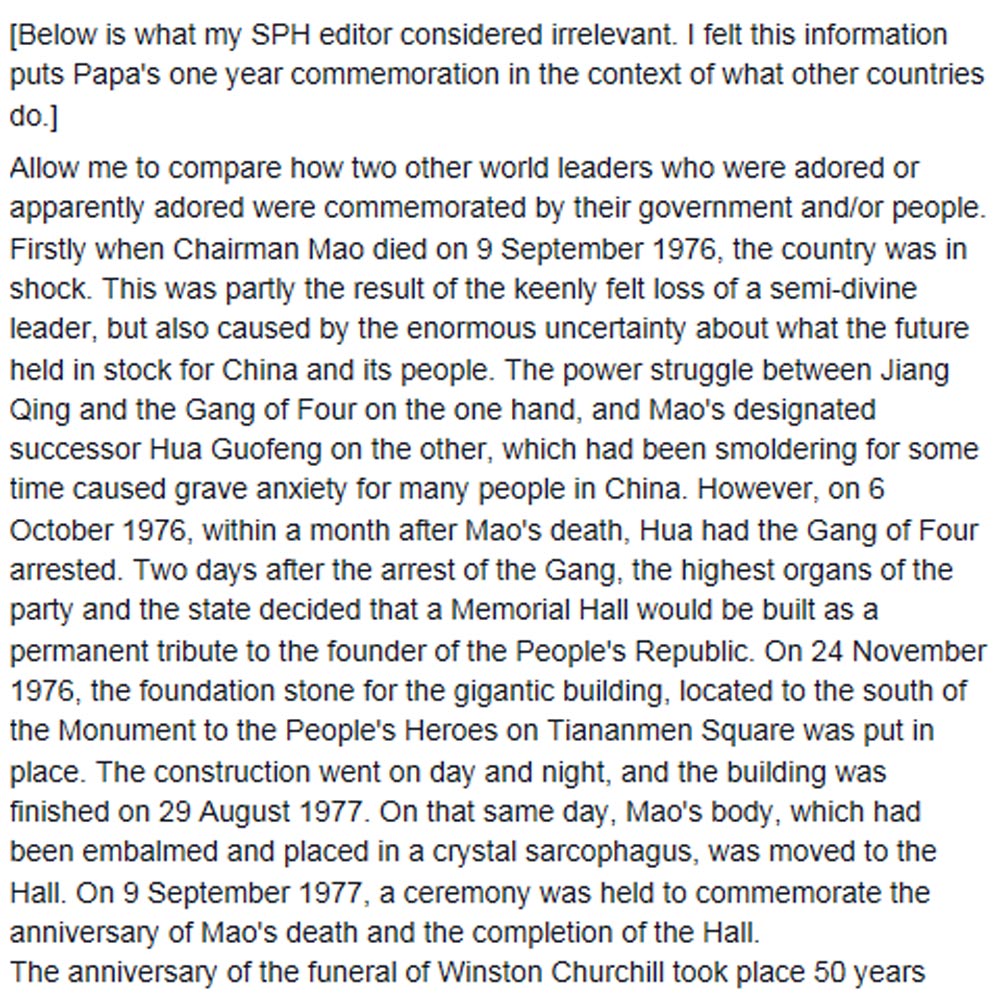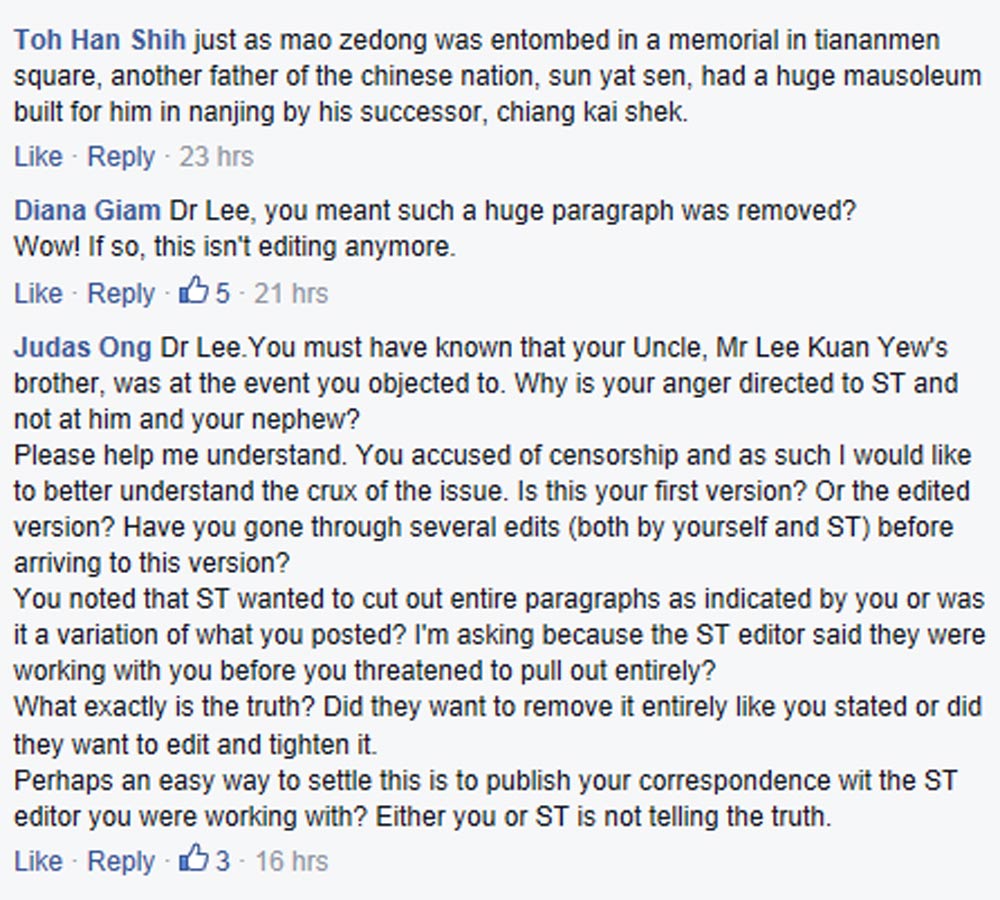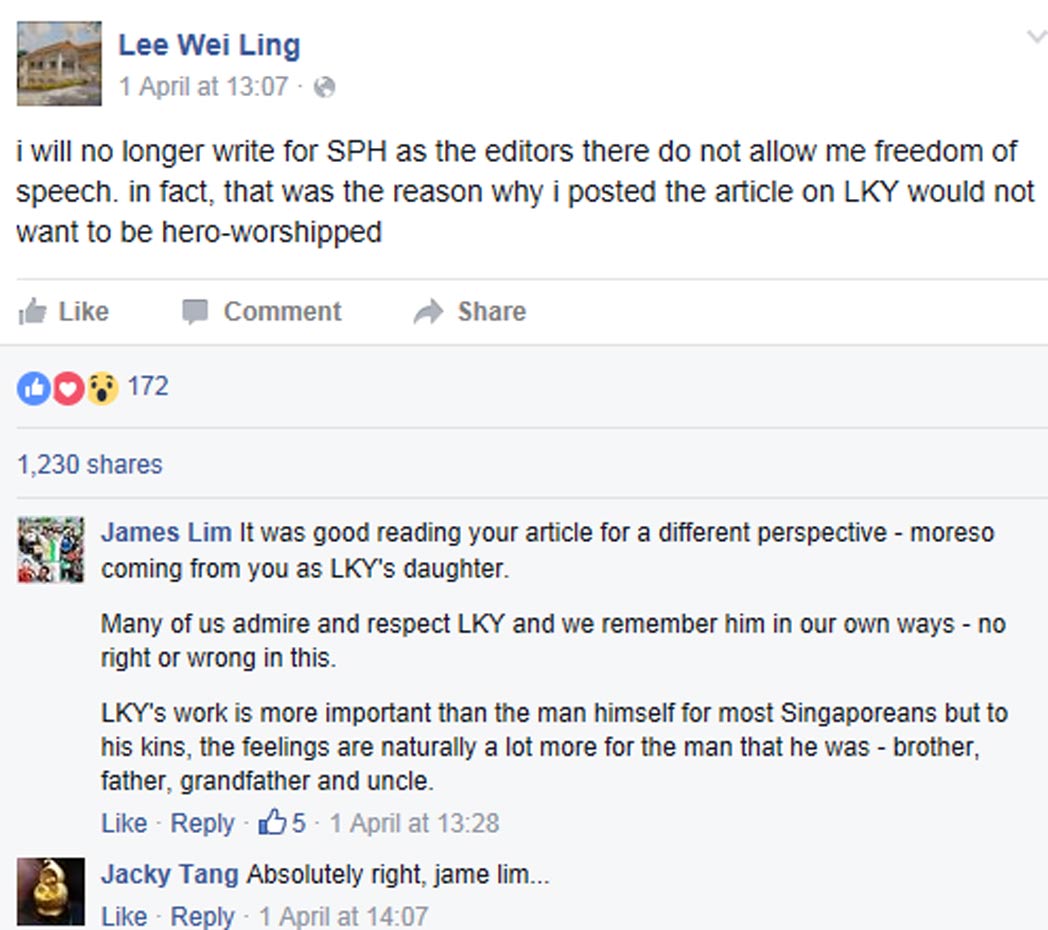Several issues of serious journalistic concern arose from recent allegations by Dr Lee Wei Ling, a former columnist of The Sunday Times, after she blogged about events last month to commemorate the death of her father, Mr Lee Kuan Yew.
In a Facebook post on April 1, Dr Lee wrote: “i will no longer write for SPH as the editors there do not allow me freedom of speech. in fact, that was the reason why i posted the article on LKY would not want to be hero-worshipped.”
I had been editing Dr Lee’s columns since last November. So it pained me when she also alleged that those who edited her columns had been “commanded to edit certain issues out, and they are to (sic) timid to disobey, and too embarrassed by their timidness to tell me the truth”.
In another posting, Dr Lee alleged that her article, which had earlier been sent to me for publication in The Sunday Times, was rejected because I had deemed certain parts as “irrelevant”, while she thought them crucial.
I need to set the record straight on this. I did not say they were “irrelevant”, although I did have serious concerns about her latest draft, which I shall come to shortly.
I should first clarify an issue of wider interest to readers, namely, how commentaries are edited when submitted for publication.
In reviewing opinion pieces, an editor strives to stay true to the thrust and tone of the commentator, while bearing in mind professional standards relating to accuracy, fairness, the use of language, coherence, relevance, brevity, the law, and judgment on matters such as race and religion, among other things.
In the case of Dr Lee’s contributions, her ideas had to be honed and language tightened.
This editing process is necessarily a two-way affair, as with all commentaries in general.
Dr Lee sent me her article on what she considered “hero-worshipping” of her father on March 21. Over the course of that week, there were some 40 e-mails about the column, as we worked to get it ready for publication.
I sent her my edited version for her review on March 23, with the intended date of publication being Sunday, March 27.
She replied on March 23 (the day of Mr Lee’s death anniversary), saying: “Reads well. But I want to wait until the day unfolds completely.”
So all seemed well up to then. On March 25, I received another version of the column with substantial additions that I found distracting at first reading because of repeated references to China (Mao Zedong’s China had already been mentioned higher up in her piece).
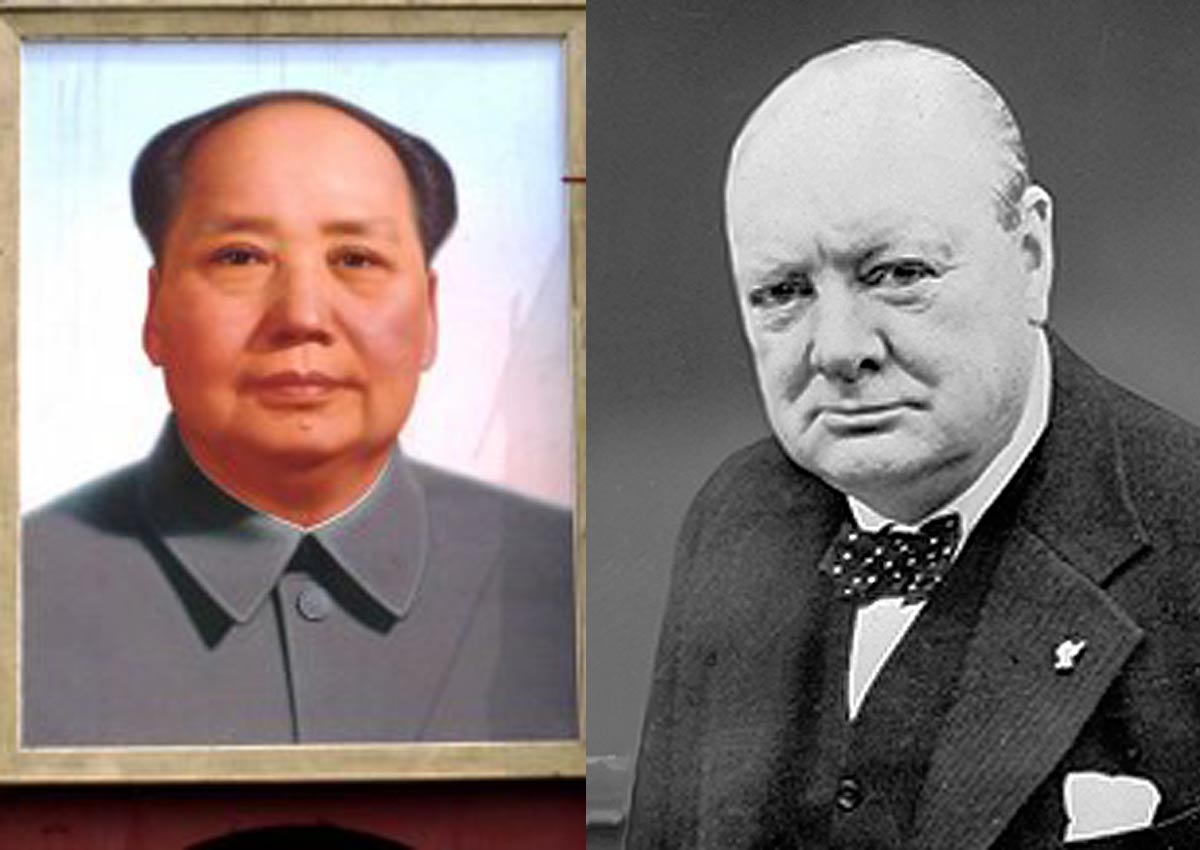
But there was another issue as well. Upon checking the accuracy of a quote she cited from British Prime Minister David Cameron, and other further checks, I found that almost three quarters of the additions had been plagiarised.
I had learnt from experience with Dr Lee’s columns that her sources needed to be double-checked.
The additional paragraphs are shown below, with the plagiarised parts in italics: “Firstly when Chairman Mao died on 9 September 1976, the country was in shock. This was partly the result of the keenly felt loss of a semi-divine leader, but also caused by the enormous uncertainty about what the future held in stock for China and its people. The power struggle between Jiang Qing and the Gang of Four on the one hand, and Mao’s designated successor Hua Guofeng on the other, which had been smoldering for some time caused grave anxiety for many people in China. However, on 6 October 1976, within a month after Mao’s death, Hua had the Gang of Four arrested.
“Two days after the arrest of the Gang, the highest organs of the party and the state decided that a Memorial Hall would be built as a permanent tribute to the founder of the People’s Republic. On 24 November 1976, the foundation stone for the gigantic building, located to the south of the Monument to the People’s Heroes on Tiananmen Square was put in place. The construction went on day and night, and the building was finished on 29 August 1977. On that same day, Mao’s body, which had been embalmed and placed in a crystal sarcophagus, was moved to the Hall. On 9 September 1977, a ceremony was held to commemorate the anniversary of Mao’s death and the completion of the Hall.
“The anniversary of the funeral of Winston Churchill took place 50 years after the actual funeral on 30 January 1965, which brought the capital to a standstill and took place a week after his death aged 90 on 24 January, is being marked by scores of events, including a service and wreath laying at the Houses of Parliament, a memorial service at Westminster Abbey, and the rebroadcast by BBC Parliament of the original live coverage. In a tribute to his most famous predecessor, the prime minister, David Cameron, said: ‘Half a century after his death, Winston Churchill’s legacy continues to inspire not only the nation whose liberty he saved, but the entire world. His words and his actions reverberate through our national life today.’
“Compare the actual time from death to the first commemoration, and the different activities involved in the commemoration in the two leaders above. Which one would Papa wish commemoration to resemble. Also bear in mind, that unlike almost all leaders, Papa was dead set against a personality cult. If he was forced to choose one form of commemoration, Papa would have objected the least if the commemoration resembled that held for Winston Churchill. Do note that Churchill unlike Papa cherished glory and a place in the history of his county. Compare what Churchill’s commemoration which was conducted 50 years after his death with the activities that have been taking place in Singapore that lasted a week. I think Papa would have objected if he were able to convey his view.”
The first paragraph was from an obscure website (http://chineseposters.net/ themes/mao-after.php):
When Mao Zedong died on 9 September 1976, the country was in shock. This was partly the result of the keenly felt loss of a semi-divine leader, but also caused by the enormous uncertainty about what the future held in stock for China and its people.
The power struggle between Jiang Qing and the Gang of Four on the one hand, and Mao’s designated successor Hua Guofeng on the other, which had been smoldering for some time, was about to be fought out in public.
However, on 6 October 1976, within a month after Mao’s death, Hua had the Gang of Four arrested.
Two days after the arrest of the Gang, the highest organs of the party and the state decided that a Memorial Hall would be built as a permanent tribute to the founder of the People’s Republic.
On 24 November 1976, the foundation stone for the gigantic building, located to the south of the Monument to the People’s Heroes on Tiananmen Square, was put in place…
The construction went on day and night, and the building was finished on 29 August 1977. On that same day, Mao’s body, which had been embalmed and placed in a crystal sarcophagus, was moved to the Hall.
On 9 September 1977, a ceremony was held to commemorate the anniversary of Mao’s death and the completion of the Hall.
The second paragraph was from London’s The Guardian newspaper (http://www.theguardian.com/ uk-news/2015/jan/30/winston- churchill-50th-anniversary-of- funeral-commemorated):
The anniversary of the funeral on 30 January 1965, which brought the capital to a standstill and took place a week after his death aged 90 on 24 January, is being marked by scores of events, including a service and wreath laying at the Houses of Parliament, a memorial service at Westminster Abbey, and the rebroadcast by BBC Parliament of the original live coverage.
In a tribute to his most famous predecessor, the prime minister, David Cameron, said: “Half a century after his death, Winston Churchill’s legacy continues to inspire not only the nation whose liberty he saved, but the entire world. His words and his actions reverberate through our national life today.”
In Dr Lee’s e-mail on March 25, she said she was adamant that The Sunday Times run the latest version of her article unedited.
She added: “I am going to blog this version or a similar version of this. If there are copyright issues, then I won’t sell my copy right to SPH. I thought long and hard about it. I want the version I decide on. I hv my reason for my decision. It does not matter to me whether u agree with me or otherwise.”
Later that day, without any notice, she went ahead to post that version of the article online, thereby bringing an end to any further discussion on the editing of the column.
Given the plagiarism it contained, there was no question of our publishing her version of the article.
Further, as a matter of policy, we do not run a version of a column in our papers when another version of it has been published online.
The relationship between contributors, editors and publishers is one that is based on trust.
That is broken when ultimatums are issued; no newspaper editor would accept columns on that basis, however illustrious the writers.
But what matters more, of course, is the relationship between publications and their readers. For the sake of that, I have no choice but to make these disclosures about the pains taken to uphold professional standards.
ivanf@sph.com.sg

This article was first published on April 9, 2016.
Get a copy of The Straits Times or go to straitstimes.com for more stories.
